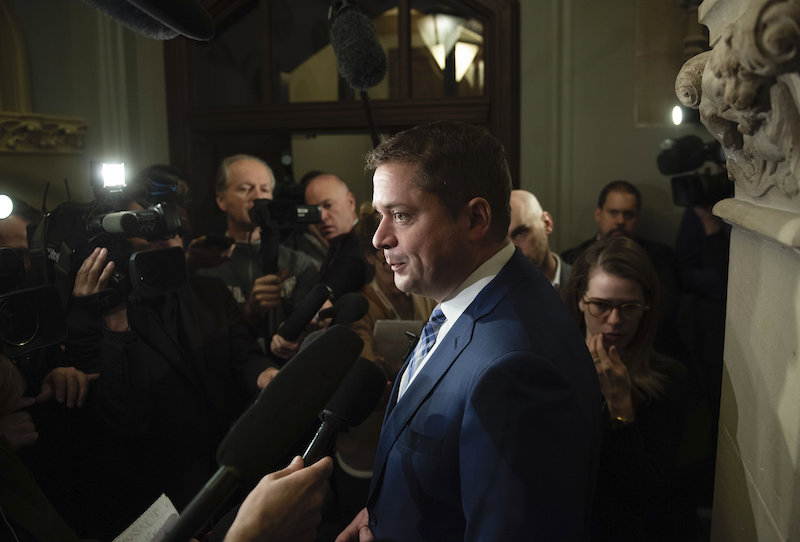And so it ends for Andrew Scheer, his promise to fight for his job as Conservative leader blown away by growing party pressure to dump him.
Now the big question is how the Conservatives avoid a leadership contest that leaves them even worse off.
Scheer’s resignation, Global News first reported, came after revelations he was using party funds to help pay for private schools for his children.
Using the money was wrong. Conservative supporters don’t donate to the party so its leader has a slush fund for personal expenses. And Scheer is being paid $264,400 a year and lives rent-free in a taxpayer-funded 34-room mansion with a chef, chauffeur and household manager. He could afford the school bills.
Scheer’s office said today that’s not why he quit. But it’s hardly an approach to public life that will win support from average voters.
The reality is that Scheer was done anyway. Once politicians have to say they will fight for their jobs, they’ve already effectively lost them.
You can’t fault Scheer for trying to hold on. The Conservatives won the popular vote with 34.4 per cent, up 2.5 points from Stephen Harper’s 2015 total. They added 26 seats, to 121. They held the Liberals to a minority government.
But none of that makes the opposition benches any more comfy.
Worse, the party blew an opportunity. Justin Trudeau and the Liberals were lugging baggage like the SNC-Lavalin and blackface scandals and should have been vulnerable. Instead, Scheer faltered.
Scheer has done the usual failed leader stuff since the election — fire a few staff, blame poor communications, promise to “listen.”
But the issue wasn’t communications. People understood what Scheer offered, and 66 per cent of voters didn’t like it.
In fact the more voters learned about Scheer, the less they liked what they heard.
Pollsters track support for leaders by asking people if they approve or disapprove of the job they’re doing. Scheer started the campaign with a net 18-per-cent disapproval rating — 28 per cent of Canadians approved of the job he was doing, 46 per cent disapproved.
But the CBC reported his net disapproval rating had climbed to 28 per cent by the campaign’s end, the worst decline for a leader in any of the last four elections. (NDP leader Jagmeet Singh’s net rating jumped by 39 points.)
The campaign highlighted serious flaws in Scheer the candidate.
For starters, his lack of experience outside politics — he’s spent his entire adult life as an MP, with his most significant private sector work experience a few months helping in an insurance office. (His claims to have been an insurance broker were exposed as false during the campaign.)
And Scheer was hopeless in dealing with concerns that his religion-driven social conservatism would lead him to impose his views on abortion and same-sex marriage on Canadians. It became, former Harper-era cabinet minister Peter Mackay said, “a stinking albatross” hanging around Scheer’s neck.
But the fault wasn’t all Scheer’s. The Conservative platform was so skimpy as to be non-existent.
For example, polls suggested climate change was a critical issue for many voters; one found 82 per cent of Canadians considered it a serious problem. But the Conservative’s glossy climate plan seemed written for the small minority of Canadians still in full-on denial.
A lot can go wrong with leadership races, as the Conservatives demonstrated in 2017 when 17 would-be leaders sought support. (Four dropped out along the way.)
It took 13 rounds before Scheer eked out a victory. The party came within a whisker of choosing Maxime Bernier as leader, with what would have been disastrous consequences. There were allegations of irregularities in the vote count and complaints that anti-abortion groups had played an outsize role in determining the outcome. (All par for the course for leadership races, as Alberta Premier Jason Kenney’s scandal-wracked victory shows.)
Even without scandals, the Conservatives risk ending up with another leader whose views are distant from most Canadians. The ballots tend to be cast by the party’s base, and core Conservative supporters see the world differently than other voters.
A majority of supporters of the other four parties, for example, see climate change as a key issue — 50 per cent of Bloc Québécois supporters, 65 per cent of Liberals, 71 per cent of Greens and 58 per cent of New Democrats. Only eight per cent of Conservative supports see it as an important issue.
They’re equally out-of-step on immigration, particularly non-white immigration.
The risk is their pick for leader will reflect the views of the party’s base — and alienate most voters.
And the risk of division is higher given the regional polarization in Canada. Saskatchewan and Alberta Conservatives will see this as a chance to select a champion to lead the party. If they do, the party’s chances in Ontario and B.C. will suffer. If they don’t, the Conservatives will have angered supporters in its two strongholds.
All leadership contests tend to be divisive and leave scars. This time, the wounds could be deeper as the Conservatives move further away from their historical place on the centre-right — and from electoral success. ![]()
Read more: Politics, Federal Politics
















Tyee Commenting Guidelines
Comments that violate guidelines risk being deleted, and violations may result in a temporary or permanent user ban. Maintain the spirit of good conversation to stay in the discussion.
*Please note The Tyee is not a forum for spreading misinformation about COVID-19, denying its existence or minimizing its risk to public health.
Do:
Do not: